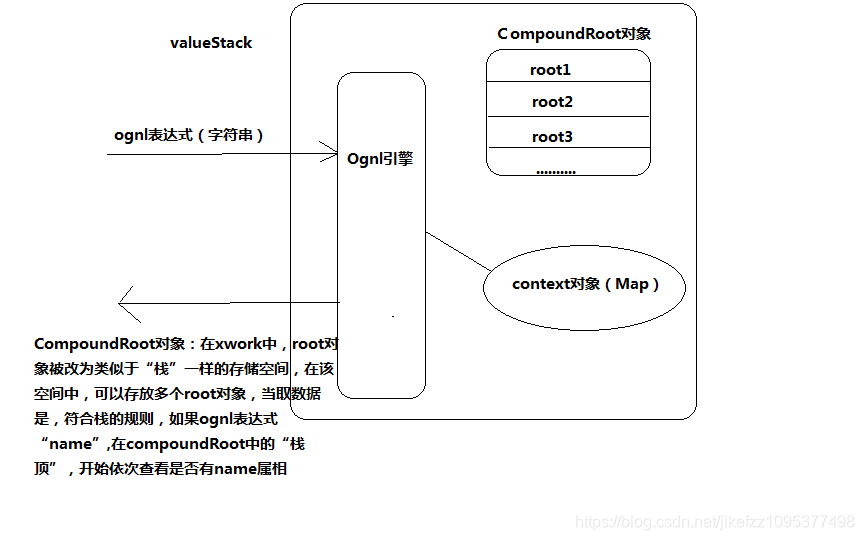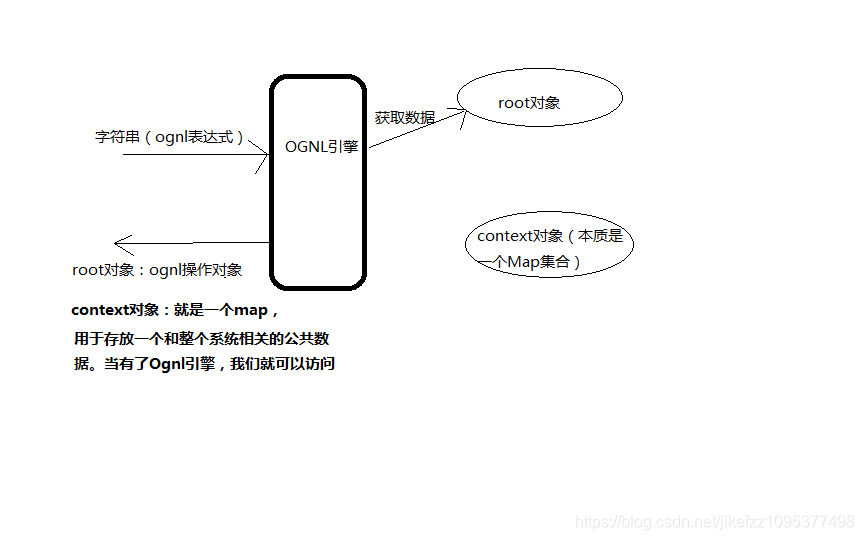import java.util.ArrayList;
import java.util.Arrays;
import java.util.Date;
import java.util.HashMap;
import java.util.List;
import java.util.Map;
import ognl.Ognl;
import ognl.OgnlException;
import ognl.OgnlRuntime;
import org.junit.Test;
import com.opensymphony.xwork2.ognl.accessor.CompoundRootAccessor;
import com.opensymphony.xwork2.util.CompoundRoot;
public class TestOgnl {
@Test
public void f(){
System.out.println(Integer.parseInt("F"));
}
//OGNL的基础语法
@Test
public void test1() throws OgnlException{
Foo foo = new Foo();
foo.setId(100);
foo.setName("java");
foo.setAry(new String[]{"one","two","three"});
foo.setList(Arrays.asList("A","B","C"));
HashMap<String,String> map =
new HashMap<String,String>();
map.put("one", "java");
map.put("two", "javajava");
map.put("three", "javajavajava");
foo.setMap(map);
//ognl引擎访问对象
//格式: Ognl.getValue("OGNL表达式",root对象)
//root对象是Ognl要操作的对象
//1、基本类型属性
System.out.println("####1、基本类型属性");
System.out.println(Ognl.getValue("id", foo));
System.out.println(Ognl.getValue("name", foo));
//2、数组、List属性
System.out.println("####2、数组、List属性");
System.out.println(Ognl.getValue("ary[0]", foo));
System.out.println(Ognl.getValue("list[1]", foo));
//3、map属性
System.out.println("####3、map属性");
System.out.println(Ognl.getValue("map.one", foo));
System.out.println(Ognl.getValue("map['two']", foo));
//4、基本运算
System.out.println("####4、基本运算");
System.out.println(Ognl.getValue("id+100", foo));
System.out.println(Ognl.getValue("\"What is\" +name", foo));
System.out.println(Ognl.getValue("id>150", foo));
//5、调用方法
System.out.println("####5、调用方法");
System.out.println(Ognl.getValue("name.toUpperCase()", foo));
System.out.println(Ognl.getValue("list.size()", foo));
//注意:方法的参数也可以使用属性
System.out.println(Ognl.getValue(
"map['three'].lastIndexOf(name)", foo));
//6、调用静态方法,取出的属性为参数
System.out.println("####6、静态方法");
System.out.println(
Ognl.getValue(
"@java.util.Arrays@toString(ary)", foo));
//7、ognl中只能创建List和Map对象
System.out.println("####7、创建List对象");
Object obj = Ognl.getValue("{1,2,3,4,5}", null);
System.out.println(obj.getClass().getName());
System.out.println(obj);
System.out.println("####8、创建map对象");
obj = Ognl.getValue(
"#{1:'java',2:'javajava',3:'javajavajava'}", null);
System.out.println(obj.getClass().getName());
System.out.println(obj);
}
@Test
public void test2() throws OgnlException{
Dept dept = new Dept();
dept.setName("dept1");
List<Emp> list = new ArrayList<Emp>();
list.add(new Emp(100,"emp1",10000,new Date()));
list.add(new Emp(200,"emp2",15000,new Date()));
list.add(new Emp(300,"emp3",20000,new Date()));
list.add(new Emp(400,"emp4",25000,new Date()));
dept.setEmpList(list);
//演示1:
String name = (String)Ognl.getValue("empList[0].name", dept);
Double salary = (Double)Ognl.getValue("empList[0].salary", dept);
System.out.println(name+":"+salary);
//演示2:
Object obj = Ognl.getValue("empList.{salary}", dept);
System.out.println("演示2");
System.out.println(obj.getClass().getName());
System.out.println(obj);
//演示3:
//过滤演示:找出薪水大于15000的员工姓名
obj =
Ognl.getValue(
"empList.{?#this.salary>=15000}.{name}",
dept);
System.out.println(obj.getClass().getName());
System.out.println(obj);
}
@Test
public void test3()throws OgnlException{
//自定义context对象,如果不写,系统会自动添加
Map ctx = new HashMap();
ctx.put("num", 10);
//root对象
Bar root = new Bar();
root.setName("bar");
//不加"#",表示从业务对象root当中获取
System.out.println(Ognl.getValue("name",ctx, root));
//加"#",表示从公共对象context中获取数据
System.out.println(Ognl.getValue("#num",ctx, root));
}
@Test
public void test4()throws OgnlException{
//创建一个CompoundRoot对象
CompoundRoot root = new CompoundRoot();
Bar bar1 = new Bar();
bar1.setName("hahaha bar1");
root.push(bar1);
Bar bar2 = new Bar();
bar2.setName("hehehe bar2");
root.push(bar2);
// root.add(bar2)
//定制Ognl的root机制为CompoundRoot机制
OgnlRuntime.setPropertyAccessor(CompoundRoot.class,
new CompoundRootAccessor());
String name = (String)Ognl.getValue("name", root);
System.out.println(name);
}
}









 本文详细介绍了OGNL(对象图导航语言)的基础语法及其在Java中的应用,包括访问对象属性、数组、List和Map,执行基本运算,调用方法和静态方法,创建List和Map对象,以及在复杂对象结构中的数据检索。
本文详细介绍了OGNL(对象图导航语言)的基础语法及其在Java中的应用,包括访问对象属性、数组、List和Map,执行基本运算,调用方法和静态方法,创建List和Map对象,以及在复杂对象结构中的数据检索。
















 2048
2048

 被折叠的 条评论
为什么被折叠?
被折叠的 条评论
为什么被折叠?








